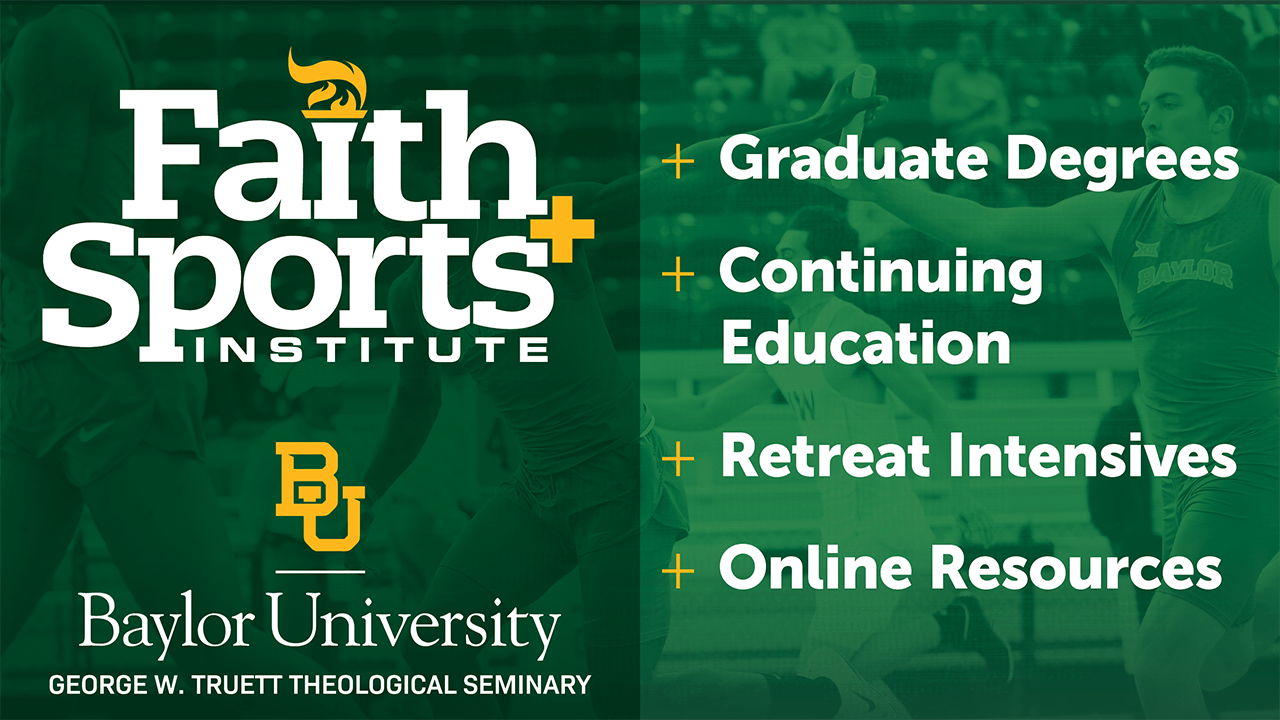
“Arsenal Vs Watford” by joshjdss is licensed under CC BY 2.0
Editor’s note: In March 2021, Truett Seminary hosted its sports ministry spring chapel service. Josh Flores Olvera, a Truett Seminary graduate, was one of two speakers. His chapel talk has been revised and posted here. You can watch the full service online at the FSI YouTube page.
Josh Flores Olvera
My journey into sports ministry is an unconventional one. I was not a coveted D-1 athlete. I was never involved in the Fellowship of Christian Athletes or Athletes in Action. In fact, I didn’t even have a Sport Ministry concentration while at Truett. No, my journey into sports ministry began with an awkward interaction at a local coffee shop in Waco, Texas.
Shortly after the Title IX scandal that rattled our university, I woke up one morning and walked to Common Grounds. The line was already out the door, and since I had not yet had my morning coffee, my headphones were in so that I could pretend to listen to music and avoid talking to people.
Don’t judge me, you’ve done it, too.
As the line inched forward, I began to feel like the person behind me was uncomfortably close. So much so that I took my headphones out to ask them if they could back up. But then I turned around: it was newly-hired head football coach Matt Rhule. Rather than asking him to back up I felt the need to apologize for invading his space.
As the line moved forward we kept talking, and it was like we were old friends. “If there’s ever anything I can do for you,” he told me afterwards, “please let me know.”
That’s where he messed up. My parents taught me to never offer something I couldn’t actually provide. And I’m not too shy or proud to take someone up on what they offer. So when I remembered that I needed a mentoring experience in order to graduate from Truett, I asked him if I could do some chaplain work with the Baylor football team.
One season later, under the leadership of Baylor Athletics’ Director of Sports Ministry, John Maurer, I was stepping onto the practice field. Thus began my introduction into sports ministry.
My love for sports ministry did not come about just because I was with the Baylor football program. It was also inspired by my involvement with the Faith & Sports Institute. As part of my preparation for working with Baylor football, FSI director and Truett professor John White required that I participate in the FSI Retreat and had me read about the intersection between sports and faith. My eyes were opened to a whole new paradigm and framework through which to make disciples.
But while the context of sports as a site for ministry was new to me, there was another sense in which it was familiar, resonating in a deep way with my understanding of God’s work in the world.
Perhaps you’ve read Isaiah 64:1-5. Here, we see the author poetically express his desire to see God’s kingdom played out on Earth as it is in Heaven. “Oh, that you would rend the heavens and come down,” the author declares, “that the mountains would tremble before you!”
Why this yearning?
Because after God’s intervention and mighty acts, evil remains. But this author knows God is His only hope.
I suspect that we’ve all had moments like the author of Isaiah 64, where we’re in such a state of heightened emotion that saying things directly isn’t enough to adequately express ourselves. Maybe we’ve written a poem or a song after losing a loved one. Maybe we’ve isolated ourselves in our room and played Celine Dion because of an intense break up in high school.
Regardless of what it was, we’ve all experienced that moment where we finally let our guard down and, for a brief moment, allow ourselves to be seen without worry of consequence or self-image or vulnerability. In those moments, we don’t hide what we seek; we don’t cover up our desire for God to rip open the heavens and come down and make things right already.
Sports, I’ve come to understand, lay bare those yearnings and desires in a similar way. All around us, day after day, athletes and coaches are putting their most vulnerable selves on display for us to see.
In her book Touchdowns for Jesus and Other Signs of the Apocalypse, theologian Marcia Mount Shoop writes about this reality:
Sports generate emotions that we do not often have permission to fully express in other facets of our lives. Excitement, disappointment, anger, joy, frustration, and delight are authorized as full-bodied experiences in sports. We can jump up and down, we can yell when people make us mad, we can scold people when they disappoint us, and we can lift them up when they give us joy and make everything work. For many, the world makes sense in the confines of a stadium in a way it does not anywhere else… Sports can be where things are as they should be, where we know who is on our side and who is not. Sports can tell us where we belong… These expressions and their intensity are versions of religious, even mystical experiences.
For some reason, when athletes compete, they surrender themselves to the game and we are allowed to peek behind a curtain that would otherwise remain closed had they simply shown up to a Bible study or Sunday service. In this sacred reality we in sports ministry have a chance to step in pastorally and steward people’s vulnerability.
I find it fitting that the ancient Greeks used to compete naked. While I’m thankful athletes wear clothes today, nakedness is an apt metaphor for how sports can reveal our souls and inner longings. Of course, that is not to say I don’t encounter egos or arrogance in sports. I see plenty of that. But I also see what matters to a person’s very core: their “why”, their motivator, their allegiance. That thing which is usually hushed and domesticated when congregants walk in on Sunday mornings into our pews.
That vulnerability is why I fell in love with FSI and the sports ministry program at Truett. Because in sports ministry you never have to wonder what your “congregants” are yearning for. In sports ministry, you see it on display every time they pass the ball to each other, every time they win or lose. And when I partner with God’s Spirit to work in their lives, God lets me play a small part in helping to reorient their yearnings from fame, acknowledgment, or riches to God’s eternal Kingdom and love.
How different would this world look if the sports we played reflected how much we valued God’s love for us?
FSI was the place that helped me re-calibrate how I saw myself and others in sports. It’s where I understood that I could encounter God regardless of my performance. To think that I only experience God when I do something good—when I score a touchdown or make a great play—is like thinking that I can only experience God on Sundays when the music is just right or when I’m coming back from an emotional high during summer youth camps. FSI helped me tear the veil so that God’s presence wasn’t just in the end zone, but the source from which I played.
I now have the pleasure of taking what I’ve learned with FSI and Baylor football and applying it to high school football players as a character coach. In my role I balance the separation of church and state but I do not compromise my witness. In a culture that can become transactional, self-centered, and utilitarian, a Christ-centered individual can bring fresh air and a better way to young athletes.
This year our team had a successful season, but we fell short of a championship. After our loss in the second round of the playoffs, one of my athletes—whom I call “Lil Nephew” because I’m not old enough to look like his daddy but apparently I’m old enough to look like his uncle— came up to me crying. “Coach, it’s not fair,” he said. “I work so hard and give it my all. It’s not fair to give it your all and still lose.”
In that moment, I saw behind the curtain. I saw a young man’s desire for God to “tear open the heavens and come down.” I saw a part of him that I would not have seen on a Wednesday night or Sunday morning. And I responded with an embrace. “No, it’s not fair,” I told him. “But I am proud of the man that you are becoming.”
I don’t know if I said the right thing. I don’t know if I said the wrong thing. But that brief, sacred moment of vulnerability helped me see what he carries, how God has wired him and what he longs for. By yielding to the Holy Spirit, I hope to play a small role in transforming that yearning for success to an allegiance to God’s Kingdom.
When I first came to Truett, I had no idea moments like that could happen in sports. But I’m thankful that God used an encounter at a crowded coffee shop on a random summer day to open up those possibilities.
Even if you don’t have an interest in sports, if you’re a Truett student I’d encourage you to take a sports ministry class or get involved in the FSI Retreat. In the same way that good coaching develops good character beyond the field, FSI will help you be a better minister regardless of your area of ministry. You don’t have to like sports. You just have to love athletes.
And here’s the best part: You will never have to wonder what your athletes yearn for. You will see the things that cause them to say: “O that you would tear open the heavens and come down…”
 About the author: Josh Flores Olvera serves as the Missions Minister at First Baptist Church Temple. After graduating from Truett with an MDiv in World Christianity and Witness in May 2019, Josh moved to Temple and shortly thereafter married his bride, Haley. He has a passion for preaching, cross-cultural witness and sports ministry. In addition to his role at the church, he also serves as one of two Character Coaches for the Temple High School varsity football and baseball team.
About the author: Josh Flores Olvera serves as the Missions Minister at First Baptist Church Temple. After graduating from Truett with an MDiv in World Christianity and Witness in May 2019, Josh moved to Temple and shortly thereafter married his bride, Haley. He has a passion for preaching, cross-cultural witness and sports ministry. In addition to his role at the church, he also serves as one of two Character Coaches for the Temple High School varsity football and baseball team.





